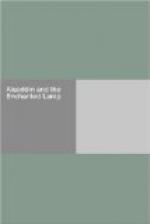[FN#133] Or “God forbid!” (Hhasha), a common interjection, implying unconditional denial.
[FN#134] Lit. “The writing of (or he wrote) his writ upon thee” (ketb kitabiki aleiki).
[FN#135] i.e.. at the Last Day, when men will be questioned of their actions.
[FN#136] Night DXII.
[FN#137] Sic (tentsur), but this is probably a copyist’s error for “we may see” (nentsur), the difference being only a question of one or two diacritical points over the initial letter.
[FN#138] Here Burton adds, “Indeed I had well nigh determined to forfeit all my profit of the Ninth Statue and to bear thee away to Bassorah as my own bride, when my comrade and councillor dissuaded me from so doing, lest I should bring about my death.”
[FN#139] Night DXIII.
[FN#140] Or (vulg.) “I thank him, etc.” (istekthertu aleihi elladhi hefitsaha wa sanaha wa hejeba rouhaku anha). Burton, “Albeit I repeatedly enjoined him to defend and protect her until he concealed from her his face.”
[FN#141] Or we may read “went out, glad and rejoicing, with (bi) the young lady;” but the reading in the test is more consonant with the general style of the Nights.
[FN#142] Azaa, strictly the formal sitting in state to receive visits of condolence for the death of a relation, but in modern parlance commonly applied, by extension, to the funeral ceremonies themselves.
[FN#143] El kendil el meshhour. The lamp is however more than once mentioned in the course of the tale by the name of “wonderful” (ajib, see post, p. 88, note 4) so familiar to the readers of the old version.
[FN#144] Night DXIV.
[FN#145] Khilafahu, lit. “the contrary thereof;” but the expression is constantly used (instead of the more correct gheirahu) in the sense of “other than it,” “the take,” etc.
[FN#146] Or “street-boys” (auladu ’l hhareh).
[FN#147] Zeboun.
[FN#148] Burton adds here, “Counsel and castigation were of no avail.”
[FN#149] Lit. “had been recalled” (tuwouffia), i.e. by God to Himself.
[FN#150] This old English and Shakspearean expression is the exact equivalent of the Arabic phrase Khelesza min sherr walidihi. Burton, “freed from [bearing] the severities of his sire.”
[FN#151] Kanet wayyishuhu. Burton, “lived only by.”
[FN#152] Night DXV.
[FN#153] I prefer this old English form of the Arabic word Meghrebiy (a native of El Meghreb or North-Western Africa) to “Moor,” as the latter conveys a false impression to the modern reader, who would naturally suppose him to be a native of Morocco, whereas the enchanter came, as will presently appear, from biladu ’l gherbi ’l jewwaniy, otherwise Ifrikiyeh, i.e. “the land of the Inner West” or Africa proper, comprising Tunis, Tripoli and part of A]geria.




